Industry flat, says Marvin (and the data)
A few weeks back, Hortistician Dr. Marvin Miller gave us the quick rundown on the latest USDA/NASS Floriculture Crops Summary for 2018. But while crunching the numbers, Marvin noted that something didn’t seem quite right. Some of the math added up to less than it should have. He pointed out the error to NASS and they’ve issued a correction. Here’s Marvin’s explanation:
In this revision, they corrected the errors in the previously released report regarding the Expanded Totals found in the table on page 7 of the original report. Their conclusion remains that growers with $100,000 or more in 2018 sales increased their totals 8.8% over the 2015 sales levels. However, when the smaller growers, i.e., those with sales from $10,000 to $99,999, are added to the mix, the revised numbers suggested that the expanded sales totals in 2018 were 9% higher than the 2015 levels, as opposed to the 5.8% originally reported. (That’s the error he spotted.)
It is important to note that three states, which participated in earlier years (Hawaii, Maryland and South Carolina), are no longer contributing to the 2018 totals. In contrast, five new states were added to the 2018 totals, largely in an effort to achieve greater geographic diversity. The five new states, Alaska (which was added at the request of Alaska’s U.S. Senator Murkowski for the state’s cut peony growers), Colorado, Connecticut, Virginia and Wisconsin, accounted for over 69% of the increase in value of the 2018 total over the 2015 level. Furthermore, the total 2018 sales of the five new states were 120.4% higher than the 2015 sales total for the three states that discontinued participation. So much of the nearly 9% growth overall is accounted for by the change in these five new states replacing the three states no longer engaged with this survey.
In somewhat sharp contrast, examining the 12 states that participated in both the 2015 and the 2018 surveys, the increase in their total sales was only 2.9% over that three-year period. If one were to consider inflation over that time, true growth would be reported as a minor fraction of this 2.9%.
Marvin, does this mean that the industry is flat?
“Yes.”

Ball Seed's Blitz
Psst! Hey, you … Yeah, you, who’s reading this newsletter … It’s Jen Zurko. And since my boss Mr. B is gallivanting around Alaska, he kindly asked me to proof and send this newsletter for him. So that gives me the green light to elbow my way into it to add a bit of travel news myself, right? Here you go …
Unless you’ve been living in a cave for the last year or so, you’ve probably heard all about the new Impatiens Downy Mildew (IDM)-resistant impatiens series that both PanAmerican Seed (Beacon) and Syngenta (Imara XDR) have recently introduced.
It’s a big deal for every segment of the supply chain—the growers can add Impatiens walleriana back into their product offering, retailers can sell them without worrying if they’ll die in their customers' yards (ditto for landscapers) and consumers can re-gain confidence in buying one of their favorite shade plants.
It’s because of all these reasons that Ball Seed has developed a new sales program centered around the Beacon Impatiens series they’re calling the “Beacon Blitz.”
The goal is to “bring impatiens back to greenhouses,” so the Ball Seed sales team is focusing their efforts to communicate the features and benefits of Beacon to their customers around the country in time for them to order their seed and plugs for this coming spring.
To kick off the Beacon Blitz, Ball Seed sales reps were on-hand at the Penn State University Flower Trials on July 25, where Beacon was on display in containers and in rows for the 250-plus trials visitors to see for themselves.
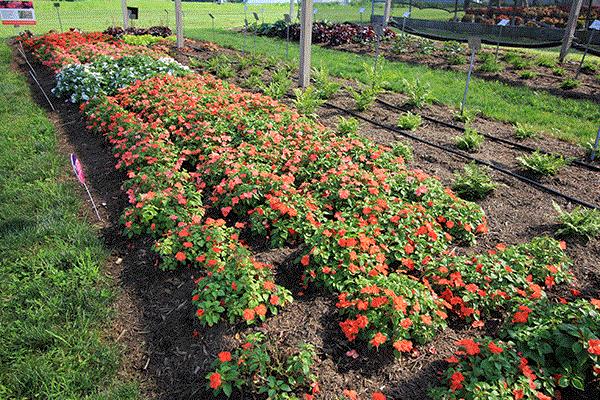
Beacon Impatiens at the Penn State Flower Trials.
Jerry Mahoney, a regional sales manager for Ball Seed, was there in person, talking up Beacon and offering people incentives for placing their orders. I asked him why go through all the fuss to create an entire sales program around one series and to Jerry it was a no-brainer.
“We have to get the word out,” Jerry stated. “Consumers have no confidence in Impatiens walleriana. We have to build up the confidence level of the consumer and get the landscapers to start planting them again.”
The Northeast part of the country, where Jerry’s territory is, was especially hard-hit with IDM. Jerry said that, in the Northwest, I. walleriana used to be 65% to 80% of a growers’ production; after the effects of IDM, it went down to 5% to 10%. He said it will probably take up to three years to make up the ground they lost, but he and other sales reps feel that what they’ve seen in trials from Beacon will help them get close to those numbers again.
“Beacon isn’t just an improvement on I. walleriana, but totally new breakthrough breeding,” said Jerry.
Steve Engel, a regional account manager for PanAmerican Seed, said it simply: “Just look at the trials. They speak for themselves.”
Want to get on the Beacon bandwagon? Contact your Ball Seed sales rep or call (800) 879-BALL.
Now back to your regularly scheduled newsletter ...

Three growers talk about HydraFiber
If you're interested in the new wood fiber technology, and specifically the product HydraFiber, you can do no better than to check out the webinar I recorded July 30 with three growers who’ve been using the stuff for anywhere from a season to three years, and on crops as diverse as perennials and hemp.
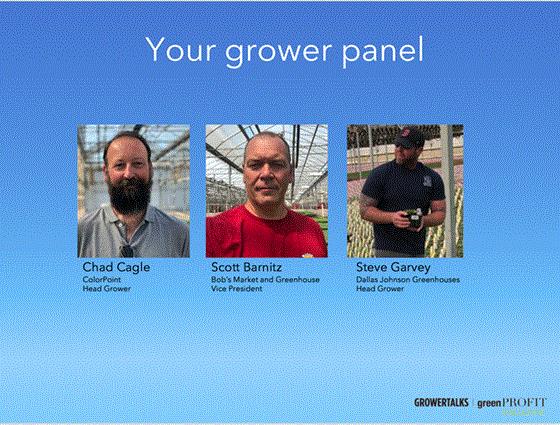
The growers are Scott Barnitz of Bob’s Market, Chad Cagle of Colorpoint and Steve Garvey of Dallas Johnson Greenhouse. You’ll also get cultural tips from Daniel Norden, Senior R&D and Technical Specialist Manager for Profile Products, the company that makes HydraFiber.
Register to watch the webinar at www.growertalks.com/webinars.
Ray Cloyd on aphids
Long-time GrowerTalks contributor Dr. Raymond Cloyd (oh, he happens to be an Extension Specialist at Kansas State in his spare time) has penned an extremely useful publication titled “Aphid Management in Greenhouse Production Systems.” I skimmed it and it goes into tremendous detail about everything aphid, from biology (did you know aphids have tailpipes?) to biological controls and everything in between.
You can find it in PDF form here: www.bookstore.ksre.ksu.edu/pubs/MF3442.pdf
Excellent work, Ray! Now, how about thrips, whiteflies, mealybugs, fungus gnats …?
OHP add two insecticides and a herbicide
Just in time for the fall season, OHP offers up more options for your insect and weed management arsenal, and are labeled for the ornamental nursery and greenhouse markets.
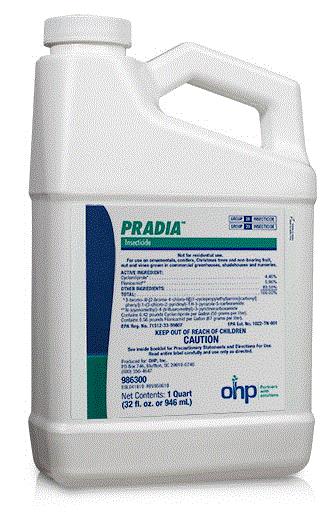
Pradia is a broad-spectrum, innovative and novel combination product developed for control of both sucking and chewing insect pests on ornamentals. It combines two active ingredients—cyclaniliprole and flonicamid—to provide quick knockdown and lengthy residual activity of many troublesome pests, including whiteflies, thrips, aphids, leafminers, armyworms, moths and caterpillars, loopers, plant bugs, Japanese beetles, lace bugs and beetles, including flea beetles.
It has both contact and systemic activity. And its overlapping spectrums of control will help prevent the development of resistance. As a plus, it’s compatible with parasitic wasps, predatory mites and lady beetles, and so is ideal for use as a tool in an IPM program.
Pradia is formulated as a user-friendly soluble concentrate in quart containers and has a 12-hour REI.
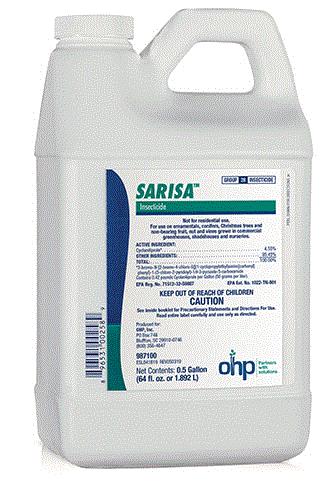
Sarisa is another broad-spectrum insecticide for ornamental greenhouse and nursery stock. The active ingredient is cyclaniliprole, which provides extended residual protection against key nursery and greenhouse pests, such as thrips, beetles (including flea beetles and Japanese beetles), armyworms, gypsy moths, loopers, plant bugs, lace bugs and leafminers.
A diamide insecticide, Sarisa provides quick knockdown and residual activity of sucking, as well as chewing insects with its novel mode of action and has a four-hour Restricted Entry Interval (REI). And like Pradia (which contains the same AI), Sarisa is compatible with many beneficial insects.
Sarisa is formulated as a soluble concentrate that may be tank mixed with appropriate partner products. (The use of a spreader sticker may help performance.)
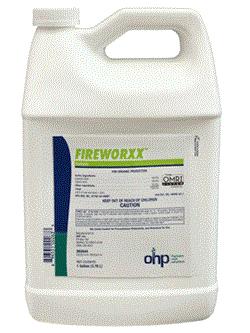
As for the new herbicide, it’s called FireWorxx, an OMRI-listed, fast-acting biological herbicide that's active against weeds, algae and moss. It uses a non-staining ammonium soap of fatty acids and is a non-selective herbicide that controls or suppresses many troublesome weeds, such as bittercress, chickweed, groundsel, dandelions, oxalis and grasses.
Use it on weeds, algae, and moss, in greenhouses, nurseries, landscaped areas, flower gardens, around buildings and sidewalks, in gravel and in other areas. Users should be aware not to spray on desirable plants. FireWorxx can be used in cooler weather conditions.
FireWorxx has a 12-hour Restricted Entry Interval (REI) and Caution Signal Word.

Ball FloraPlant’s Las Limas farm achieves MPS-GAP certification
Congrats to sister company Ball FloraPlant for being awarded MPS-GAP certification from MPS, the organization that manages sustainability certification for the international flower and ornamentals industry.
With MPS-GAP, operations can promote their “Good Agricultural Practices” through the requirements of traceability, environment, worker safety and site cleanliness. It offers a transparent look at business practices and protocols that benefit suppliers and customers.
“We are proud of our dedicated protocols and impressive facility, as well as its managers and committed staff who produce the best cuttings for our customers,” says Ball FloraPlant President Mike Klopmeyer (pictured here on the left with MPS’s Arthij van der Veer and Ball’s Bill Doeckel). The presentation was made during Cultivate'19.
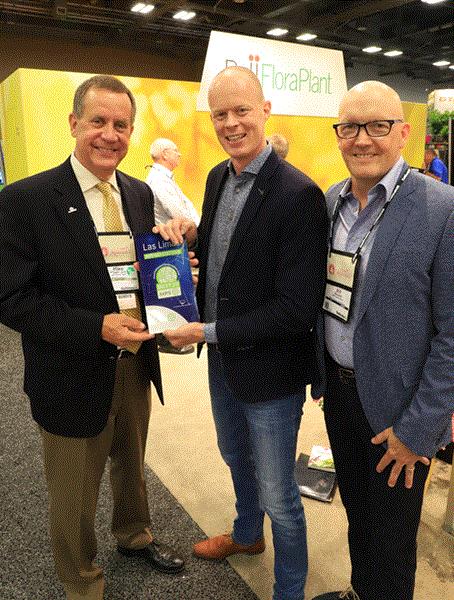
MPS worked closely with Las Limas General Manager Alex Meneses. The MPS-GAP checklist includes an inspection of whether equipment is maintained on a regular basis, and how employees handle pesticides and fertilizers. Risk reduction and product traceability are also key standards reviewed for MPS-GAP certification.
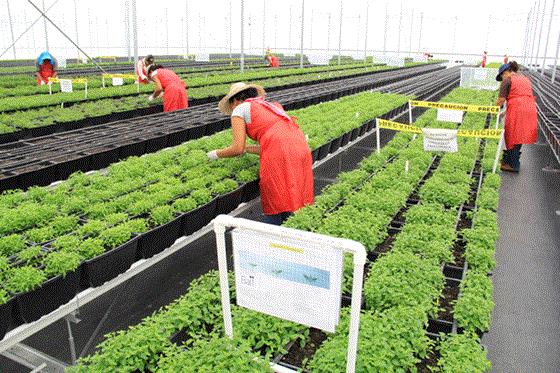
Some of the key initiatives of Las Limas that helped earn MPS-GAP include: Maintaining a process on material delivery; upgraded fuel facilities according to national norm NTON 14-024-14; and annual first aid (CPR and Heimlich maneuver) certification brigades and safe chemicals handling certification, which supports the Ball FloraPlant commitment to product traceability, sustainability and safety.
To learn more about the Las Limas facility and Ball FloraPlant, please visit www.ballfloraplant.com.

Koppert acquires Natural Enemies
The cannabis industry’s effect is being felt in many places and many ways in horticulture and here’s one more: Koppert Biological Systems has acquired a company that specializes in chemical-free pest management for commercial cannabis production.
Natural Enemies was founded in 2014 when Shane Young saw the emerging cannabis market and the need to help educate growers on the effective use of biological controls—or as he terms them, “BCAs” or biological control agents. The company quickly became a leader in the field, attracting the attention of Koppert. The two companies share the ambition of providing superior customer service and educating growers about the benefits and the patience needed for development of a successful IPM program.
“We are very excited and grateful that the Natural Enemies team has joined Koppert Biological Systems,” said Ryan Hill, General Manager of Koppert USA in a statement. “Since 2014, Shane and his team have developed and grown the Natural Enemies name into one of the leaders in the industry. With the addition of the Koppert supply chain, our goal will be to take what they have developed and work jointly to expand it,”

Hishtil to offer Basewell cuttings
Dümmen Orange and Hishtil recently signed a Memorandum of Understanding (MoU) for joint collaboration on promoting bare-rooted cuttings under the Basewell brand. Basewell is Dümmen Orange’s technology for shipping bareroot cuttings from offshore propagation nurseries. The goal is to help growers optimize their time and space while saving labor.
This MoU means:
- Dümmen Orange and Hishtil will set up a joint standard of product specifications, to assure consistent quality of all Basewell products to their customers
- Hishtil will start applying Basewell to its production and product labeling in 2020
- A new range of Basewell herb products from Hishtil will become available to the North American market
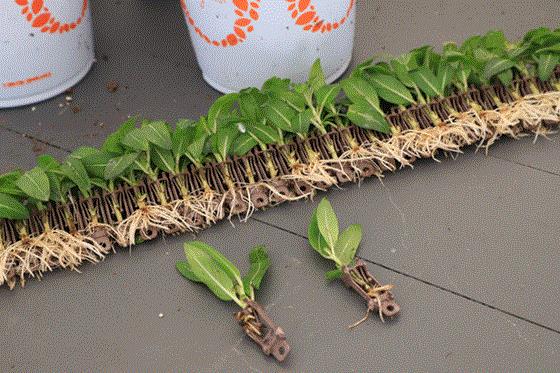
Basewell, as seen at Spring Trials.
Dümmen Orange made its Basewell annual and perennials available to the North American market in 2018. This year, they launched their annuals to the European market, with more Basewell products on the way. Dümmen Orange is focusing on broadening the Basewell line by collaborating with new partners like Hishtil to add more options and diversity to the assortment.

Finally …
They say plants can help reduce crime. In this case, they kept an already serious crime from becoming even worse.
It seems an Austrian woman, a triathlete, was on a bike ride when a man in a van knocked her unconscious and kidnapped her. She awoke naked and tied to a chair.
Remaining calm, the woman managed to sweet talk her captor into releasing her, in part by complimenting his orchids.
“I admired them,” she told reporters. “All of the sudden the culprit was nice to me. He said he was a gardener.”
Read the full story HERE.
See you next time,

Chris Beytes
Editor
GrowerTalks and Green Profit
This e-mail received by 23,670 loyal readers!
Thanks to my loyal sponsors, who help me reach the 23,670 readers of Acres Online in 66 countries. Want to be one of them (a sponsor, that is)? Give Paul Black a shout and he'll hook you up.